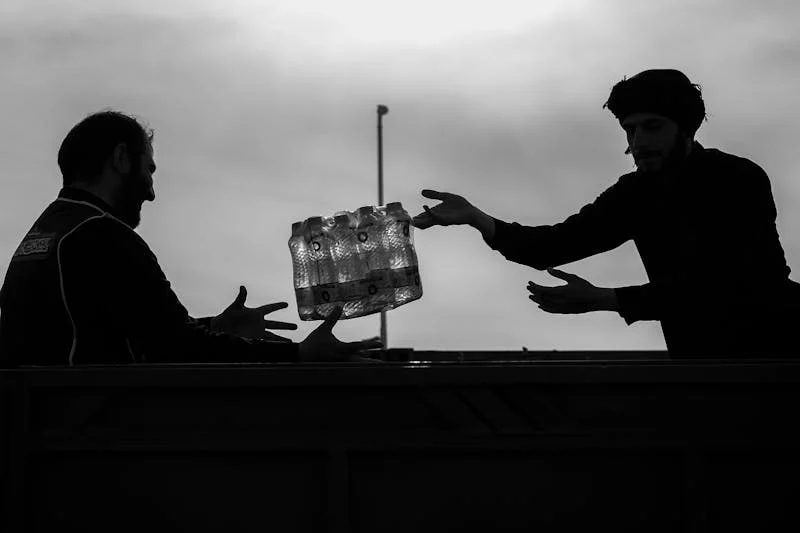
The idea of “cooperative networks of peer support”, championed by the organization called “Humans United in Mutual Aid Networks” represents an incredibly powerful, untapped potential for addressing the economic and social challenges that increasingly characterize modern life.
And by leveraging platforms like KommunityKoin.com as a foundational framework, these networks can cultivate a thriving mutual aid economy that empowers marginalized groups, fosters resilience, and creates a blueprint for sustainable community living.
The Vision: Cooperative Networks of Peer Support
At its core, a mutual aid economy thrives on the principle of reciprocity. Unlike traditional economic systems that prioritize profit and competition, mutual aid emphasizes collaboration and shared resources. Platforms like KommunityKoin.com can serve as a digital nexus where members of a Kommunity can exchange time, skills, services, and resources rather than currency, creating a decentralized, trust-based economy. This system empowers participants to address their immediate needs while fostering long-term relationships and solidarity within their communities.
Imagine a network where a retired teacher tutors children in exchange for home-cooked meals, or a mechanic repairs bikes in return for gardening assistance. By cataloging these exchanges digitally through KoinPurse.com, participants accumulate credits that can be redeemed for other services, ensuring that contributions are valued equitably and transparently.
Why Now? The Case for Urgency
Economic hardship is becoming a defining feature of the 21st century. The lingering effects of the COVID-19 pandemic, coupled with rising inflation, wealth inequality, immigration pressures, and climate-induced disruptions, have left millions struggling to make ends meet. In this environment, the traditional safety nets provided by governments and large institutions are increasingly strained, leaving communities to fend for themselves.
Mutual aid networks offer a lifeline, particularly for those who fall through the cracks of existing systems. Immigrant communities, the elderly, and economically marginalized groups often lack access to reliable social support. Mutual aid networks can bridge these gaps, offering a localized, adaptable solution that empowers people to support one another without relying solely on external resources.
Empowering Immigrants and Marginalized Groups
Immigrant communities and other economically disadvantaged populations stand to gain significantly from mutual aid networks. These groups often face systemic barriers to employment, housing, and healthcare. By participating in a mutual aid-based economy, they can exchange skills and services that might otherwise go undervalued in the traditional market.
For instance, an immigrant skilled in sewing could offer tailoring services in exchange for childcare or transportation. By valuing their contributions within a mutual aid economy, these individuals gain agency and build social capital, which can translate into better integration and stability over time. Furthermore, the localized nature of these networks fosters cultural exchange and understanding, strengthening community bonds.
Barriers to Implementation and Strategies for Overcoming Them
Despite its promise, the mutual aid economy faces several hurdles:
Lack of Awareness and Trust: Many people are unfamiliar with the concept of mutual aid or hesitant to trust informal systems. Public education campaigns and pilot programs can help demonstrate the efficacy and fairness of platforms like KommunityKoin.com.
Technological Barriers: Digital platforms may exclude those without internet access or technological literacy. Solutions include offline participation mechanisms, community hubs for access, and user-friendly interfaces designed with inclusivity in mind.
Cultural and Social Norms: Societal emphasis on individualism and competition can discourage cooperative behaviors. Reframing mutual aid as a practical and empowering choice rather than a charitable or altruistic act can shift mindsets.
Regulatory Challenges: Mutual aid networks may face scrutiny or restrictions from authorities concerned about tax implications or labor laws. Advocating for policy changes that recognize the value of these networks can create a more supportive environment.
Building a Thriving Mutual Aid Economy
To successfully implement a mutual aid economy, here are a few important points to keep in mind:
Community Engagement: Begin with localized efforts to build trust and participation. Partner with existing community organizations to spread the word and recruit early adopters. It’s important that each member be committed to the idea and are willing to be an active participant, not just a bystander.
Scalability and Adaptability: Design your group to be scalable. As the number of members grows, you need to be able to grow with it. Design your group to function as simply as possible so that it can more easily adapt to changing needs of the group.
Incentives and Gamification: Using time credits is a great way to, not only track participation, but also encourage it.
Ongoing Support and Education: Provide resources and training to ensure that participants understand how to fully participate and use any platforms being leveraged and the benefits of mutual aid.
Measuring Impact: Regularly assess the network’s effectiveness through metrics like participation rates, service exchanges, and community feedback. Use this data to refine and expand the system.
The Ultimate Guide to Building Your Kommunity (click to learn how)
In a Nutshell
The development of cooperative networks of peer support through platforms like KommunityKoin.com represents a transformative opportunity to address the economic and social challenges of our time.
By promoting and fostering mutual aid economies, we can build resilient communities that prioritize human connection and shared prosperity. For immigrant communities and other marginalized groups, this approach offers a pathway to empowerment and stability.
Overcoming the barriers to implementation requires creativity, persistence, and a commitment to reimagining how we define and measure value. In doing so, we can lay the foundation for a future where mutual aid is not just an alternative but a cornerstone of a thriving society.
Join us in making the world a better place. You’ll be glad that you did. Cheer friends.